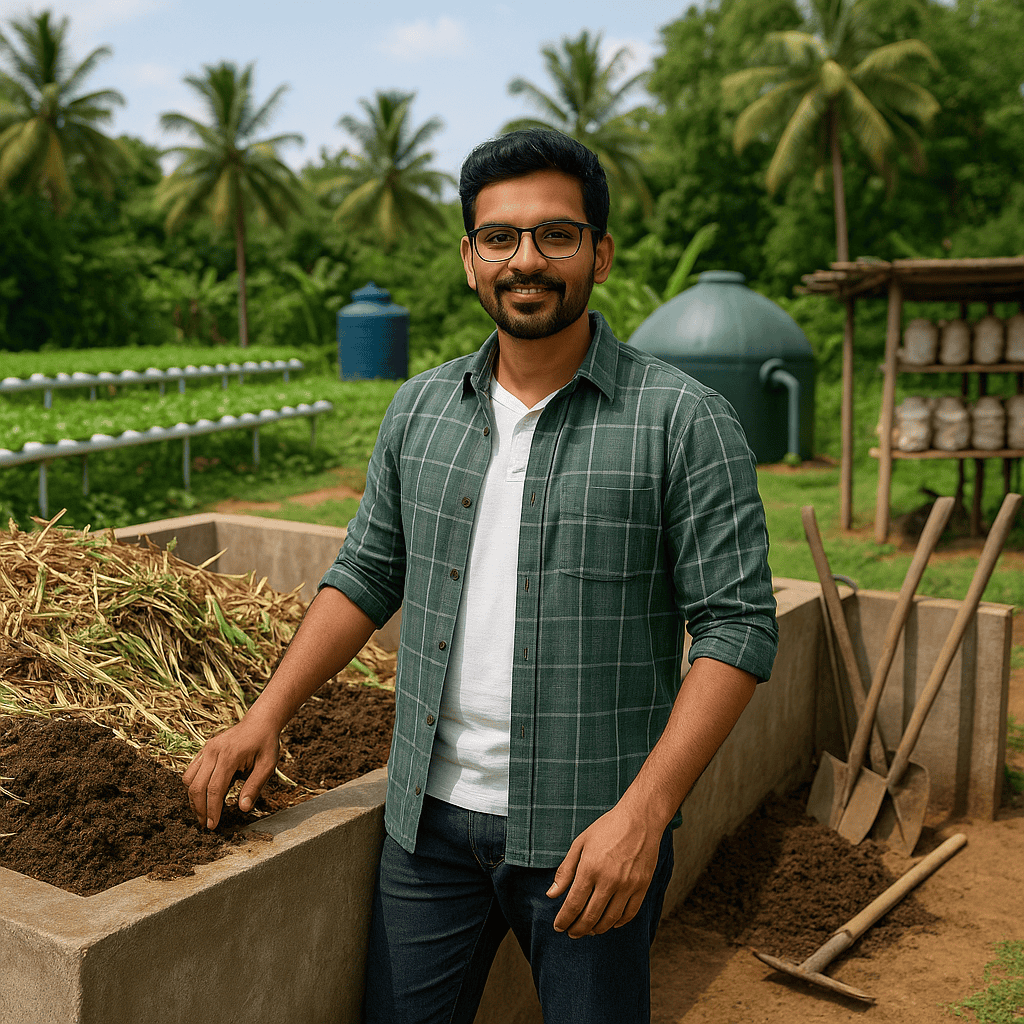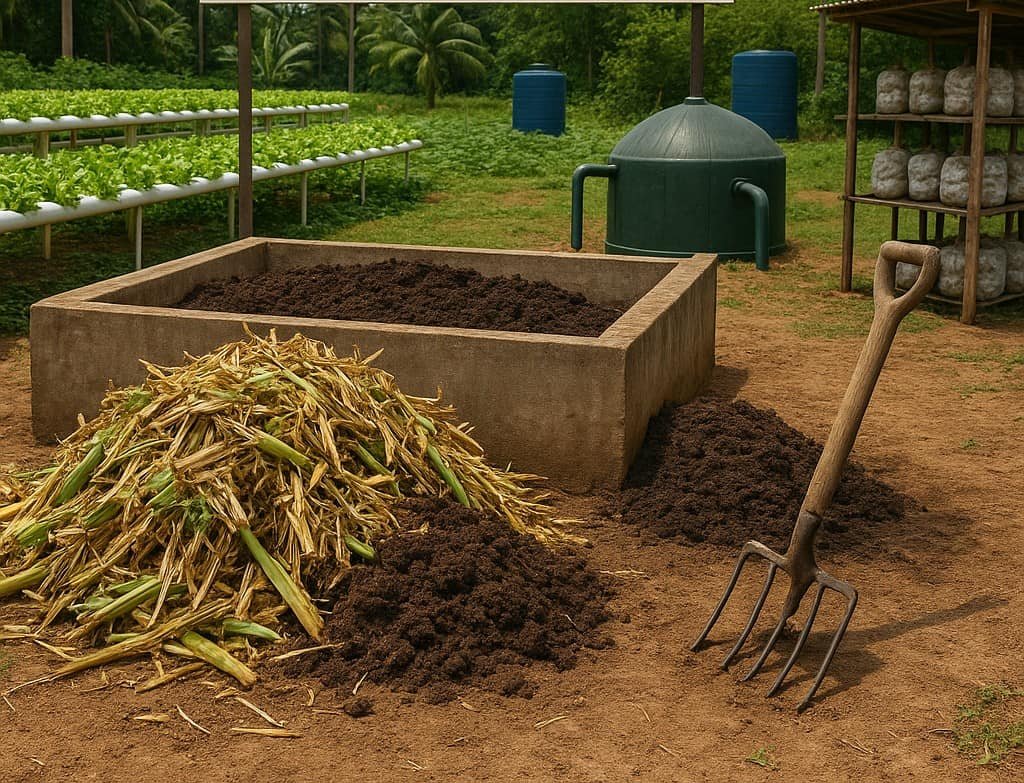Latest News
Profitable Agricultural Waste Recycling in India: Turning Trash into Treasure

{ Agricultural waste, once considered a burden to dispose of, is now emerging as a hidden treasure trove for generating income and supporting sustainability. In a country like India, where agriculture forms the backbone of the economy, large volumes of crop residues, husks, leaves, and other bio-wastes are produced every year. When managed properly, this “waste” can be transformed into valuable products—fertilizers, biofuels, compost, packaging material, and even electricity. }
In this blog, we’ll explore how recycling agricultural waste is not only environmentally friendly but also a potentially profitable venture. We’ll also cover different recycling methods, successful business ideas, and answer some commonly asked questions at the end.

What is Agricultural Waste?
Agricultural waste includes:
- Crop residues: straw, husks, stalks, leaves
- Animal waste: dung, urine, bedding
- Agro-industrial waste: fruit peels, pulp, seed shells
- Other residues: used irrigation water, pesticide containers
India generates over 500 million tonnes of agricultural waste annually, and a large portion of it still goes unutilized. But with growing awareness and technology, farmers and entrepreneurs are finding new ways to tap into this resource.
Profitable Ways to Recycle Agricultural Waste
Here are some proven, income-generating recycling options for agricultural waste:
1. Composting and Organic Fertilizers
Converting organic farm waste into compost or vermicompost is one of the simplest and most effective recycling methods. This process not only improves soil health but also reduces reliance on chemical fertilizers. Selling compost locally or via e-commerce platforms is a growing trend.
Profit potential: ₹5–15 per kg depending on quality and packaging.
2. Biogas Production
Animal dung, food waste, and crop residues can be used in biogas plants to produce cooking gas and electricity. The by-product, called slurry, is a nutrient-rich organic manure.
Who can benefit: Dairy farms, gaushalas, and cooperatives.
Government support: Subsidies are available under the National Biogas and Organic Manure Programme (NBOMP).

An integrated agriculture waste recycling unit showcasing composting, biogas generation, hydroponics, and mushroom farming—turning farm residue into profit and sustainability.
3. Briquettes and Pellets for Fuel
Crop residues like groundnut shells, sawdust, or sugarcane bagasse can be compressed into briquettes or pellets and used as a renewable fuel in industries and kitchens.
Market demand: High in both rural and industrial settings.
Profit margin: A small-scale unit can earn ₹30,000 to ₹1 lakh per month, depending on output and market.
4. Packaging Material and Biodegradable Products
Banana stems, areca leaves, and sugarcane bagasse are now being used to manufacture eco-friendly plates, bowls, trays, and packaging material. These products are in high demand due to the ban on single-use plastic in many states.
Best for: Rural SHGs, FPOs, and agri-startups.
5. Mushroom Cultivation
Agri-waste like wheat straw and cotton waste can be reused as substrates for mushroom farming. Once the harvest is done, the leftover substrate can be composted and reused.
High ROI: Mushrooms are a high-value crop and can be sold locally or to restaurants.
6. Biochar Production
Biochar is a carbon-rich product made by burning agricultural waste in a low-oxygen environment. It improves soil fertility, retains water, and sequesters carbon.
Emerging market: Growing in organic and regenerative farming communities.
Real-Life Success Story
Gau Kranti Bio Energy, Maharashtra: This rural venture uses cow dung and crop waste to power a community biogas plant that supplies cooking fuel to 50+ households. The slurry is sold as organic fertilizer, earning them monthly revenues of ₹70,000+.
Benefits of Agricultural Waste Recycling
- Income generation for farmers and rural entrepreneurs
- Reduces environmental pollution (air, soil, water)
- Improves soil health and productivity
- Reduces reliance on chemical inputs
- Supports circular economy and rural employment
Challenges & Solutions
| Challenges | Solutions |
|---|---|
| Lack of awareness | Training, govt schemes |
| Initial setup cost | Subsidies, FPO grants |
| Market access | Online platforms, cooperatives |
| Seasonal waste availability | Storage & preservation techniques |
Q&A Section
Q1. Is it expensive to start an agricultural waste recycling business?
A: Not necessarily. Small-scale composting or biogas units can be started with as little as ₹50,000–₹2 lakh, especially with subsidies and local government support.
Q2. How can farmers sell compost or briquettes?
A: Farmers can sell locally to nearby farms, nurseries, or via online platforms like Amazon, Krishi Jagran, or agri cooperatives. Briquettes can be sold to industries and restaurants as clean fuel.
Q3. What are some government schemes supporting waste recycling?
A: Programs like:
- Pradhan Mantri Kisan Urja Suraksha evam Utthan Mahabhiyan PM-KUSUM (for biogas)
- National Biogas and Organic Manure Programme – NBOMP (for organic manure)
- Startup India & Rural Livelihood Missions offer financial and technical assistance.
Q4. Can agricultural waste recycling be done on a small scale?
A: Absolutely! Even a small family farm can start composting, mushroom growing, or making fuel briquettes with minimal investment and see a return within a few months.
Q5. What is the environmental impact of agri-waste recycling?
A: It reduces stubble burning, lowers carbon emissions, prevents soil and water contamination, and contributes to climate resilience.
Agricultural waste recycling in India is no longer just an environmental need—it’s a profitable opportunity for farmers, entrepreneurs, and rural communities. With the right mix of awareness, technology, and policy support, waste can truly become wealth.
If you’re looking to build a sustainable agri-business or add an income stream to your farm, agri-waste recycling is the way forward.





















